《大学英语》第6段-段落与课文翻译
大学英语B1第6-8单元课后段落翻译中英对照版

B1U6-U8课后段落翻译中英对照版B1 U6Part IGap year(间隔年)refers to a period of time---not necessarily a year--- in which students take timeoff and do something other than schooling, such as travel or work. The year out is most commonlytaken after high school and before going to university. During this time, a student might travel,engage in volunteer work or undertake (承担)a working holiday abroad.A new trend is toparticipate in international education programs that combine language study, home stays, culturalexchange, community service, and independent study. The practice of taking a year out developedin the United Kingdom in the 1960s. It has grown very popular among students in the UK, Australia, New Zealand, and Canada. In the United States however, the practice of taking a year off remains the exception (例外). But in recent years, taking a year out has become slightly more common for Americans. Some 40,000 American students participated in 2013 in gap year programs, an increase of almost 20% since 2006. Universities such as Princeton University, Harvard University,Massachusetts Institute of Technology have formal policies allowing students to defer (延期)admission.间隔年指的是学生休假不去上学而去旅游或工作等的一段时间,但不一定是一年。
unit6翻译
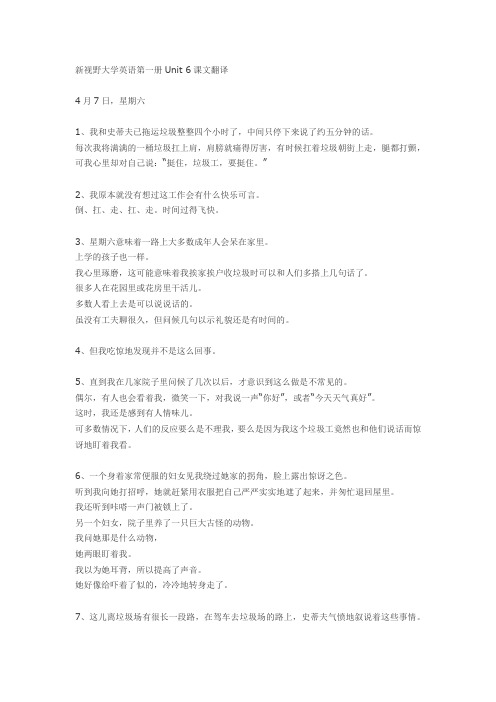
新视野大学英语第一册Unit 6课文翻译4月7日,星期六1、我和史蒂夫已拖运垃圾整整四个小时了,中间只停下来说了约五分钟的话。
每次我将满满的一桶垃圾扛上肩,肩膀就痛得厉害,有时候扛着垃圾朝街上走,腿都打颤,可我心里却对自己说:“挺住,垃圾工,要挺住。
”2、我原本就没有想过这工作会有什么快乐可言。
倒、扛、走、扛、走。
时间过得飞快。
3、星期六意味着一路上大多数成年人会呆在家里。
上学的孩子也一样。
我心里琢磨,这可能意味着我挨家挨户收垃圾时可以和人们多搭上几句话了。
很多人在花园里或花房里干活儿。
多数人看上去是可以说说话的。
虽没有工夫聊很久,但问候几句以示礼貌还是有时间的。
4、但我吃惊地发现并不是这么回事。
5、直到我在几家院子里问候了几次以后,才意识到这么做是不常见的。
偶尔,有人也会看着我,微笑一下,对我说一声“你好”,或者“今天天气真好”。
这时,我还是感到有人情味儿。
可多数情况下,人们的反应要么是不理我,要么是因为我这个垃圾工竟然也和他们说话而惊讶地盯着我看。
6、一个身着家常便服的妇女见我绕过她家的拐角,脸上露出惊讶之色。
听到我向她打招呼,她就赶紧用衣服把自己严严实实地遮了起来,并匆忙退回屋里。
我还听到咔嗒一声门被锁上了。
另一个妇女,院子里养了一只巨大古怪的动物。
我问她那是什么动物,她两眼盯着我。
我以为她耳背,所以提高了声音。
她好像给吓着了似的,冷冷地转身走了。
7、这儿离垃圾场有很长一段路,在驾车去垃圾场的路上,史蒂夫气愤地叙说着这些事情。
8、“从多数人看你的那种眼光,就知道在他们眼里垃圾工是怪物。
如果你对他们问声好,他们就惊奇地看着你。
他们根本没想到我们也是人。
”9、“有个女人往垃圾箱里倒烟灰。
我说,我们这样没法装运。
她说,…我倒什么你管得着吗,你算什么东西?你不过是个垃圾工罢了。
‟我说,…听着,太太,我的智商是137,高中毕业时是班上的尖子生。
我干这活是为了挣钱,不是因为我只能干这个。
‟”10、“我真想对他们说,…你瞧瞧,我跟你们一样干净。
外教社大学英语精读第三册 unit6 原文+翻译
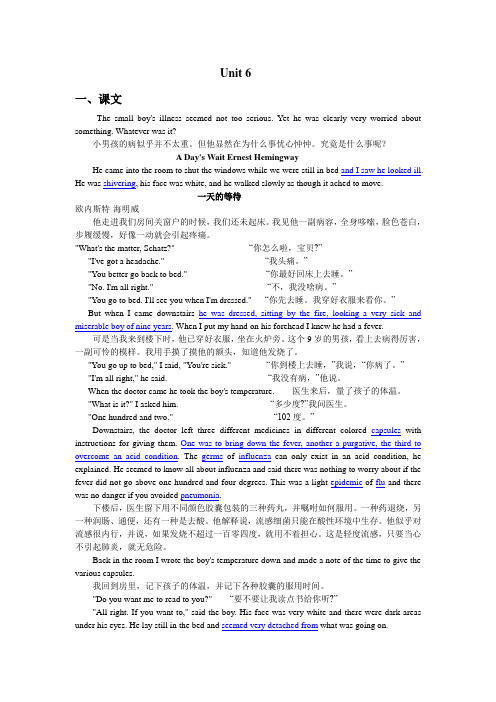
Unit 6一、课文The small boy's illness seemed not too serious. Yet he was clearly very worried about something. Whatever was it?小男孩的病似乎并不太重。
但他显然在为什么事忧心忡忡。
究竟是什么事呢?A Day's Wait Ernest HemingwayHe came into the room to shut the windows while we were still in bed and I saw he looked ill. He was shivering, his face was white, and he walked slowly as though it ached to move.一天的等待欧内斯特·海明威他走进我们房间关窗户的时候,我们还未起床。
我见他一副病容,全身哆嗦,脸色苍白,步履缓慢,好像一动就会引起疼痛。
"What's the matter, Schatz?" “你怎么啦,宝贝?”"I've got a headache." “我头痛。
”"You better go back to bed." “你最好回床上去睡。
”"No. I'm all right." “不,我没啥病。
”"You go to bed. I'll see you when I'm dressed." “你先去睡。
我穿好衣服来看你。
”But when I came downstairs he was dressed, sitting by the fire, looking a very sick and miserable boy of nine years. When I put my hand on his forehead I knew he had a fever.可是当我来到楼下时,他已穿好衣服,坐在火炉旁。
大学英语unit6原文与翻译
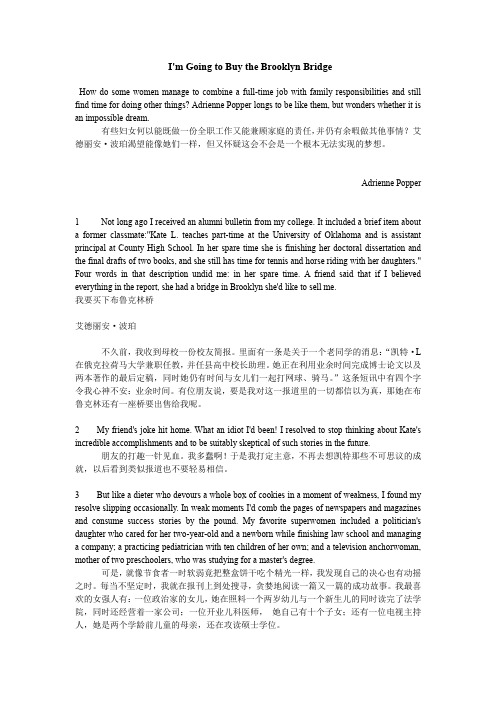
I'm Going to Buy the Brooklyn BridgeHow do some women manage to combine a full-time job with family responsibilities and still find time for doing other things? Adrienne Popper longs to be like them, but wonders whether it is an impossible dream.有些妇女何以能既做一份全职工作又能兼顾家庭的责任,并仍有余暇做其他事情?艾德丽安·波珀渴望能像她们一样,但又怀疑这会不会是一个根本无法实现的梦想。
Adrienne Popper1 Not long ago I received an alumni bulletin from my college. It included a brief item abouta former classmate:"Kate L. teaches part-time at the University of Oklahoma and is assistant principal at County High School. In her spare time she is finishing her doctoral dissertation and the final drafts of two books, and she still has time for tennis and horse riding with her daughters." Four words in that description undid me: in her spare time. A friend said that if I believed everything in the report, she had a bridge in Brooklyn she'd like to sell me.我要买下布鲁克林桥艾德丽安·波珀不久前,我收到母校一份校友简报。
新标准大学英语第一册Unit6译文
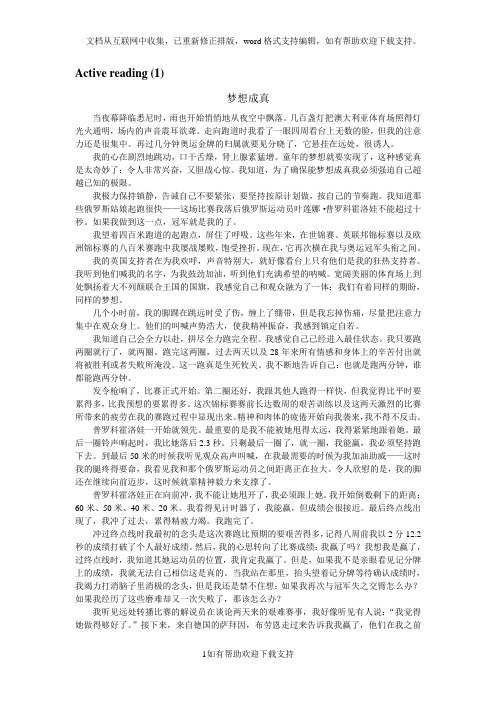
Active reading (1)梦想成真当夜幕降临悉尼时,雨也开始悄悄地从夜空中飘落。
几百盏灯把澳大利亚体育场照得灯光火通明,场内的声音震耳欲聋。
走向跑道时我看了一眼四周看台上无数的脸,但我的注意力还是很集中。
再过几分钟奥运金牌的归属就要见分晓了,它悬挂在远处,很诱人。
我的心在剧烈地跳动,口干舌燥,肾上腺素猛增。
童年的梦想就要实现了,这种感觉真是太奇妙了:令人非常兴奋,又胆战心惊。
我知道,为了确保能梦想成真我必须强迫自己超越已知的极限。
我极力保持镇静,告诫自己不要紧张,要坚持按原计划做,按自己的节奏跑。
我知道那些俄罗斯姑娘起跑很快——这场比赛我落后俄罗斯运动员叶莲娜·普罗科霍洛娃不能超过十秒。
如果我做到这一点,冠军就是我的了。
我望着四百米跑道的起跑点,屏住了呼吸。
这些年来,在世锦赛、英联邦锦标赛以及欧洲锦标赛的八百米赛跑中我屡战屡败,饱受挫折。
现在,它再次横在我与奥运冠军头衔之间。
我的英国支持者在为我欢呼,声音特别大,就好像看台上只有他们是我的狂热支持者。
我听到他们喊我的名字,为我鼓劲加油,听到他们充满希望的呐喊。
宽阔美丽的体育场上到处飘扬着大不列颠联合王国的国旗,我感觉自己和观众融为了一体:我们有着同样的期盼,同样的梦想。
几个小时前,我的脚踝在跳远时受了伤,缠上了绷带,但是我忘掉伤痛,尽量把注意力集中在观众身上。
他们的叫喊声势浩大,使我精神振奋,我感到镇定自若。
我知道自己会全力以赴,拼尽全力跑完全程。
我感觉自己已经进入最佳状态。
我只要跑两圈就行了,就两圈。
跑完这两圈,过去两天以及28年来所有情感和身体上的辛苦付出就将被胜利或者失败所淹没。
这一跑真是生死攸关。
我不断地告诉自己:也就是跑两分钟,谁都能跑两分钟。
发令枪响了,比赛正式开始。
第二圈还好,我跟其他人跑得一样快,但我觉得比平时要累得多,比我预想的要累得多。
这次锦标赛赛前长达数周的艰苦训练以及这两天激烈的比赛所带来的疲劳在我的赛跑过程中显现出来。
现代大学英语精读6 paraphrase 原文+译文版

Lesson one1.Virtueis, indeed mustbe, self-centered.(para4)正确的行动就是,确实也必须就是以自我为中心的。
By rightaction,we mean it musthelp promotepersonal interest、2.Theessentials are familiar: the poverty of thepoor was the fault of the poor、Anditwas because itwas productoftheir excessi vefecundity…、、(para5)她的基本观点为人熟知:穷人的贫穷就是她们咎由自取,贫穷就是热门过度生育的结果The poverty of the poorwas causedbytheirhaving toomanychildren.3.Povertybeing caused inthe bed meantthat the rich were not responsible foreither its creation or itsamelioration. (para6)贫穷源于过度生育意味着富人不应该为产生贫穷与解决贫穷承担责任The richwerenot to blameforthe existenceofpoverty so theyshould not be asked to undertake the taskof solving the problem.4.It is merelythe working out ofalaw ofnature and a lawof God(para8) 这就是自然规律与上帝的意志在起作用。
Itis onlythe resultor effect ofthelaw of thesurvival of the fittestapplied tonature or to human society、5.Itdeclinedin popularity, and reference toit acquired a condemnatory tone、(para9)然而在20世纪,人们认为社会学中的达尔文进化论有点过于残酷,遭到了普遍的质疑,人们提及它都带有谴责的口吻。
大学英语unit6原文与翻译

I'm Going to Buy the Brooklyn BridgeHow do some women manage to combine a full-time job with family responsibilities and still find time for doing other things? Adrienne Popper longs to be like them, but wonders whether it is an impossible dream.有些妇女何以能既做一份全职工作又能兼顾家庭的责任,并仍有余暇做其他事情?艾德丽安·波珀渴望能像她们一样,但又怀疑这会不会是一个根本无法实现的梦想。
Adrienne Popper1 Not long ago I received an alumni bulletin from my college. It included a brief item abouta former classmate:"Kate L. teaches part-time at the University of Oklahoma and is assistant principal at County High School. In her spare time she is finishing her doctoral dissertation and the final drafts of two books, and she still has time for tennis and horse riding with her daughters." Four words in that description undid me: in her spare time. A friend said that if I believed everything in the report, she had a bridge in Brooklyn she'd like to sell me.我要买下布鲁克林桥艾德丽安·波珀不久前,我收到母校一份校友简报。
新视野大学英语第三版第一册UNIT6课文翻译
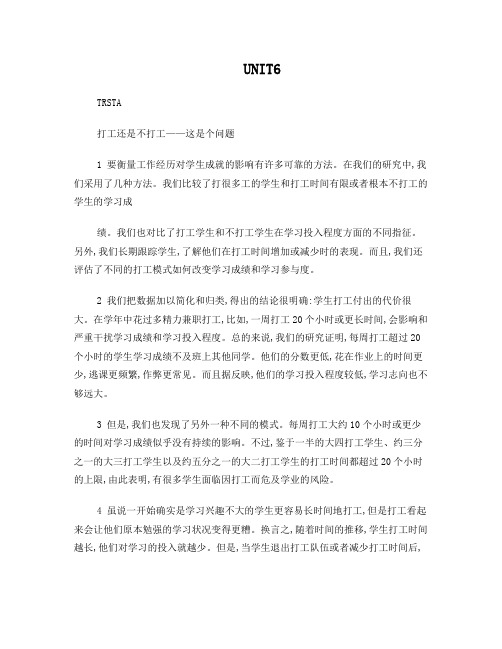
UNIT6TRSTA打工还是不打工——这是个问题1 要衡量工作经历对学生成就的影响有许多可靠的方法。
在我们的研究中,我们采用了几种方法。
我们比较了打很多工的学生和打工时间有限或者根本不打工的学生的学习成绩。
我们也对比了打工学生和不打工学生在学习投入程度方面的不同指征。
另外,我们长期跟踪学生,了解他们在打工时间增加或减少时的表现。
而且,我们还评估了不同的打工模式如何改变学习成绩和学习参与度。
2 我们把数据加以简化和归类,得出的结论很明确:学生打工付出的代价很大。
在学年中花过多精力兼职打工,比如,一周打工20个小时或更长时间,会影响和严重干扰学习成绩和学习投入程度。
总的来说,我们的研究证明,每周打工超过20 个小时的学生学习成绩不及班上其他同学。
他们的分数更低,花在作业上的时间更少,逃课更频繁,作弊更常见。
而且据反映,他们的学习投入程度较低,学习志向也不够远大。
3 但是,我们也发现了另外一种不同的模式。
每周打工大约10个小时或更少的时间对学习成绩似乎没有持续的影响。
不过,鉴于一半的大四打工学生、约三分之一的大三打工学生以及约五分之一的大二打工学生的打工时间都超过20个小时的上限,由此表明,有很多学生面临因打工而危及学业的风险。
4 虽说一开始确实是学习兴趣不大的学生更容易长时间地打工,但是打工看起来会让他们原本勉强的学习状况变得更糟。
换言之,随着时间的推移,学生打工时间越长,他们对学习的投入就越少。
但是,当学生退出打工队伍或者减少打工时间后,结果也引人注目:他们对学习的兴趣被重新激发起来。
所以,这是个好消息,即打工对学习的负面影响并非是永久性的。
5 我们发现了打工对学生学习参与度产生负面影响的很多种原因。
首先,由于紧张的打工日程,打工的学生用来完成学校作业的时间就减少了。
面临这样的时间压力,打工学生一个普遍的应付办法就是偷懒,比如选择较容易的课程、抄袭其他学生的作业、逃课或者不做老师布置的作业。
时间一长,当这些变成习以为常的做法以后,学生对学习的投入也就一点一点地减少。
新视野大学英语6 课文英汉对照翻译
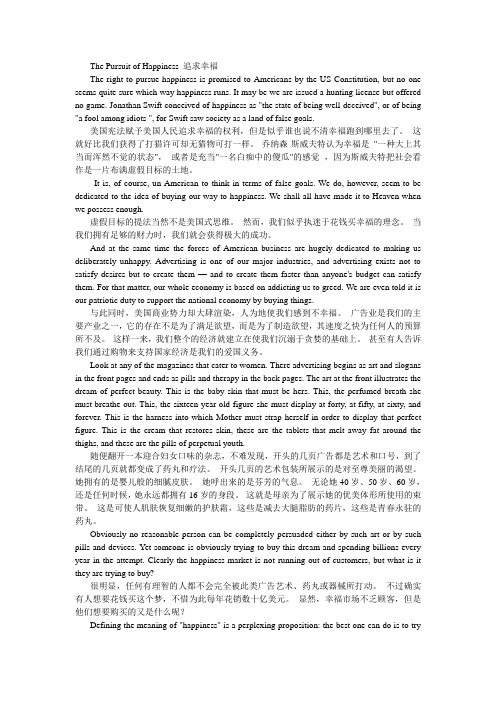
The Pursuit of Happiness 追求幸福The right to pursue happiness is promised to Americans by the US Constitution, but no one seems quite sure which way happiness runs. It may be we are issued a hunting license but offered no game. Jonathan Swift conceived of happiness as "the state of being well-deceived", or of being "a fool among idiots ", for Swift saw society as a land of false goals.美国宪法赋予美国人民追求幸福的权利,但是似乎谁也说不清幸福跑到哪里去了。
这就好比我们获得了打猎许可却无猎物可打一样。
乔纳森·斯威夫特认为幸福是"一种大上其当而浑然不觉的状态",或者是充当"一名白痴中的傻瓜"的感觉,因为斯威夫特把社会看作是一片布满虚假目标的土地。
It is, of course, un-American to think in terms of false goals. We do, however, seem to be dedicated to the idea of buying our way to happiness. We shall all have made it to Heaven when we possess enough.虚假目标的提法当然不是美国式思维。
然而,我们似乎执迷于花钱买幸福的理念。
当我们拥有足够的财力时,我们就会获得极大的成功。
现代大学英语精读6 paraphrase 原文+译文版
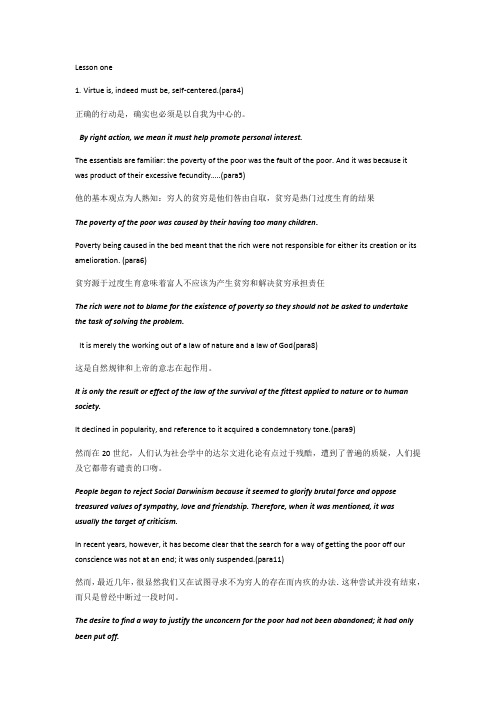
Lesson one1.Virtue is, indeed must be, self-centered.(para4)正确的行动是,确实也必须是以自我为中心的。
By right action, we mean it must help promote personal interest.The essentials are familiar: the poverty of the poor was the fault of the poor. And it was because it was pr oduct of their excessive fecundity…..(para5)他的基本观点为人熟知:穷人的贫穷是他们咎由自取,贫穷是热门过度生育的结果The poverty of the poor was caused by their having too many children.Poverty being caused in the bed meant that the rich were not responsible for either its creation or its amelioration. (para6)贫穷源于过度生育意味着富人不应该为产生贫穷和解决贫穷承担责任The rich were not to blame for the existence of poverty so they should not be asked to undertake the task of solving the problem.It is merely the working out of a law of nature and a law of God(para8)这是自然规律和上帝的意志在起作用。
It is only the result or effect of the law of the survival of the fittest applied to nature or to human society.It declined in popularity, and reference to it acquired a condemnatory tone.(para9)然而在20世纪,人们认为社会学中的达尔文进化论有点过于残酷,遭到了普遍的质疑,人们提及它都带有谴责的口吻。
新视野大学英语6-课文英汉对照翻译
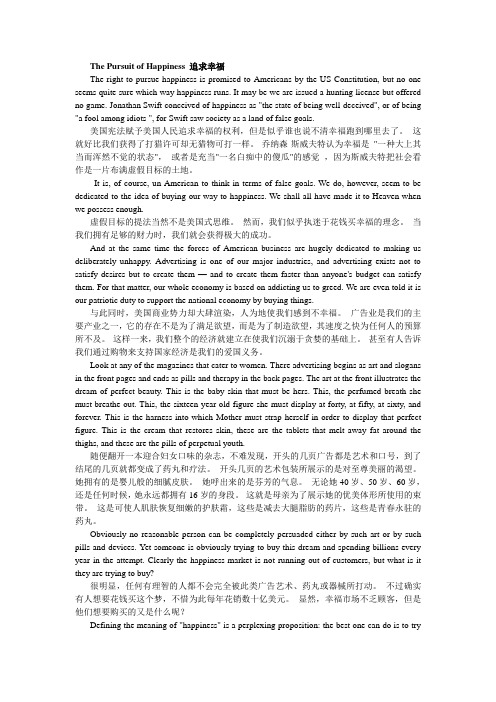
The Pursuit of Happiness 追求幸福The right to pursue happiness is promised to Americans by the US Constitution, but no one seems quite sure which way happiness runs. It may be we are issued a hunting license but offered no game. Jonathan Swift conceived of happiness as "the state of being well-deceived", or of being "a fool among idiots ", for Swift saw society as a land of false goals.美国宪法赋予美国人民追求幸福的权利,但是似乎谁也说不清幸福跑到哪里去了。
这就好比我们获得了打猎许可却无猎物可打一样。
乔纳森·斯威夫特认为幸福是"一种大上其当而浑然不觉的状态",或者是充当"一名白痴中的傻瓜"的感觉,因为斯威夫特把社会看作是一片布满虚假目标的土地。
It is, of course, un-American to think in terms of false goals. We do, however, seem to be dedicated to the idea of buying our way to happiness. We shall all have made it to Heaven when we possess enough.虚假目标的提法当然不是美国式思维。
然而,我们似乎执迷于花钱买幸福的理念。
当我们拥有足够的财力时,我们就会获得极大的成功。
Unit 6 Being There 课文翻译
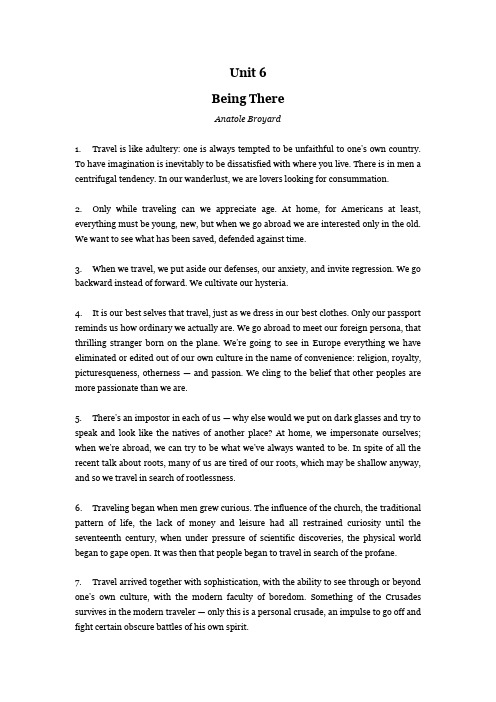
Unit 6Being ThereAnatole Broyard1. Travel is like adultery: one is always tempted to be unfaithful to one’s own country. To have imagination is inevitably to be dissatisfied with where you live. There is in men a centrifugal tendency. In our wanderlust, we are lovers looking for consummation.2. Only while traveling can we appreciate age. At home, for Americans at least, everything must be young, new, but when we go abroad we are interested only in the old. We want to see what has been saved, defended against time.3. When we travel, we put aside our defenses, our anxiety, and invite regression. We go backward instead of forward. We cultivate our hysteria.4. It is our best selves that travel, just as we dress in our best clothes. Only our passport reminds us how ordinary we actually are. We go abroad to meet our foreign persona, that thrilling stranger born on the plane. We’re going to see in Europe everything we have eliminated or edited out of our own culture in the name of convenience: religion, royalty, picturesqueness, otherness — and passion. We cling to the belief that other peoples are more passionate than we are.5. There’s an impostor in each of us — why else would we put on dark glasses and try to speak and look like the natives of another place? At home, we impersonate ourselves; when we’re abroad, we can try to be what we’ve always wanted to be. In spite of all the recent talk about roots, many of us are tired of our roots, which may be shallow anyway, and so we travel in search of rootlessness.6. Traveling began when men grew curious. The influence of the church, the traditional pattern of life, the lack of money and leisure had all restrained curiosity until the seventeenth century, when under pressure of scientific discoveries, the physical world began to gape open. It was then that people began to travel in search of the profane.7. Travel arrived together with sophistication, with the ability to see through or beyond one’s own culture, with the modern faculty of boredom. Something o f the Crusades survives in the modern traveler — only this is a personal crusade, an impulse to go off and fight certain obscure battles of his own spirit.8. Of course, one of the most common reasons for traveling is simply to get away. Freud said that we travel to escape father and the family, and we might add the familiar. There is a recurrent desire to drop our lives, to simply walk out of them.9. When we travel, we are on vacation —vacant, waiting to be filled. The frenzied shopping of some travelers is an attempt to buy a new life. To get away to a strange place produces a luxurious feeling of disengagement, of irresponsible free association. One is an onlooker, impregnable.10. We travel in summer, when life comes out of doors, and so we see only summery people, nothing of their sad falls, their long, dark winters and cruel springs. The places we visit are gold-plated by the sun. The flowers and trees are like bouquets thrown to history.11. And language — what a pleasure to leave our own language, with its clichés stuck in our teeth. How much better things sound in another tongue! It’s like having our ears cleaned out. So long as we don’t understand it too well, every other language is poetry.12. Because we travel for so many reasons —some of them contradictory —travel writing is like a suitcase into which the writer tries to cram everything. At its most interesting, it’s a continual tasting, the expression of a nostalgia for the particular. It’s a childish game of playing countries, as we used to play house.13. Travel writing describes a tragic arc: it begins with a rising of the spirit and ends in a dying fall. The earliest travelers went to see marvels, to admire the wonderful diversity of the world — but the latest travelers are like visitors sitting at the bedside of dying cultures. Early travelers fell in love at first sight with foreign places — but now we know only love at last sight, a kiss before dying, a breathing in of the last gasp. In some ancient societies, it used to be the c ustom for the son to inhale his father’s last breath, which contained his departing soul, and today’s travelers do something like this, too.14. Travel writing has become a quintessentially modern thing, the present regretting the past. We travel like insurance appraisers, assessing the damage. Militantly opposed to any kind of ethnic distinctions at home, we adore ethnicity abroad. Ironically, Americans need Europe more than Europeans do. To Parisians, for example, Paris is a place to live; for Americans, it’s a place to dream.15. “I do not expect to see many travel books in the near future,” Evelyn Waugh wrote in 1946. He saw the world turning into a “monoculture,” the sense of place giving way toplacelessness. What Waugh didn’t foresee was that travel books would change as novels and poetry have, that every slippage of culture would provoke its peculiar literature. He underestimated the variousness of our reasons for traveling.16. There have always been travelers who went to look for the worst, to find rationalizations for their anxiety or despair, to cover their disillusionment with labels, as steamer trunks used to be covered with them. Why else would Paul Theroux go to South America, which he so obviously detested? Shiva Naipaul’s worst fears were confirmed in Africa, just as his brother’s were in Asia. Graham Greene spent four months traveling in the Liberian jungle as a private penance.17. Even ruins have changed. Instead of the classical ruins of antiquity, we now have places that are merely “ruined.” And there are travelers who take a positive delight in them, who love awfulness for its own sake. For them, awfulness is the contemporary equivalent of the exotic. It’s a negative sublime, a swoon or ecstasy of spoliation.18. As other countries offer fewer exotic phenomena, the travel writer is forced to find the exotic in himself —and the picturesque as well. The centrifugal tendency turns centripetal, and modern travel books may be about the absence of things just as the classic books are about their presence. In Journey to Kars, Philip Glazebrook seems to have visited several unappealing villages in Turkey simply for the irony of being there. (Irony is the contemporary traveler’s drip-dry shirt.) One of the things a severely sophisticated traveler like Glazebrook seeks is a place where he himself can stand out in absolute relief.19. Perhaps in the future we shall have to travel like James Holman, who, after being invalided out of the British navy because he had gone blind, set out in 1819 to see the world. Traveling mostly alone, speaking no foreign languages, using only public transport, Holman got as far as Siberia and returned home to publish in several thick volumes all that he had experienced. He rarely felt, he said, that he had missed anything through being blind. (At one point, he met a deaf man and they traveled together.)20. Since he could not see, people often invited Holman to squeeze things as a way of perceiving them —and this is what today’s traveler has to do. He has to squee ze the places he visits, until they yield something, anything.1. 旅行好比私通:人总受到背叛自己国家的诱惑。
全新版大学英语综合教程 6课文翻译.
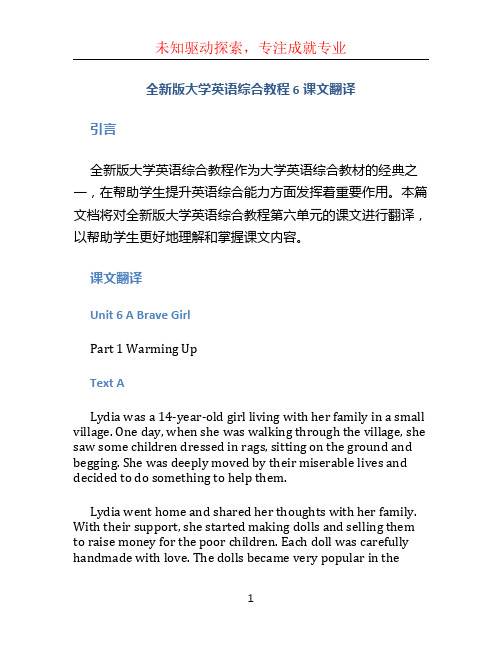
全新版大学英语综合教程 6课文翻译引言全新版大学英语综合教程作为大学英语综合教材的经典之一,在帮助学生提升英语综合能力方面发挥着重要作用。
本篇文档将对全新版大学英语综合教程第六单元的课文进行翻译,以帮助学生更好地理解和掌握课文内容。
课文翻译Unit 6 A Brave GirlPart 1 Warming UpText ALydia was a 14-year-old girl living with her family in a small village. One day, when she was walking through the village, she saw some children dressed in rags, sitting on the ground and begging. She was deeply moved by their miserable lives and decided to do something to help them.Lydia went home and shared her thoughts with her family. With their support, she started making dolls and selling them to raise money for the poor children. Each doll was carefully handmade with love. The dolls became very popular in thevillage and many people were touched by Lydia’s kindness and determination.As time went on, the number of dolls Lydia made increased. She recruited other volunteers to help her. The volunteers came from different backgrounds but all shared the same goal – to make a difference in the lives of those in need. The enthusiasm and ded ication of the volunteers made Lydia’s project more successful than she had ever imagined.The money raised from selling the dolls was used to provide food, clothing, and education for the poor children. The lives of these children gradually improved, and they began to have hope for a better future. Lydia’s project not only changed the lives of many children but also inspired kindness and compassion in the hearts of people around the village.Lydia’s efforts didn’t stop there. She continued to work hard and expand her project. Her goal was to reach out to as many children as possible, giving them the love and support they deserved. Lydia’s story touched many people, and her project received support and recognition from organizations and individuals both within and outside the village.Lydia’s brave actions and determination taught us that one person can make a difference. She showed us that even the smallest act of kindness can have a ripple effect and bring positive change to the lives of others. Inspired by her story, let us also take action and make a difference in the world.第六单元一个勇敢的女孩第一部分热身活动课文A莉迪亚是一个14岁的女孩,与家人住在一个小村庄里。
《大学英语》第6段-段落与课文翻译
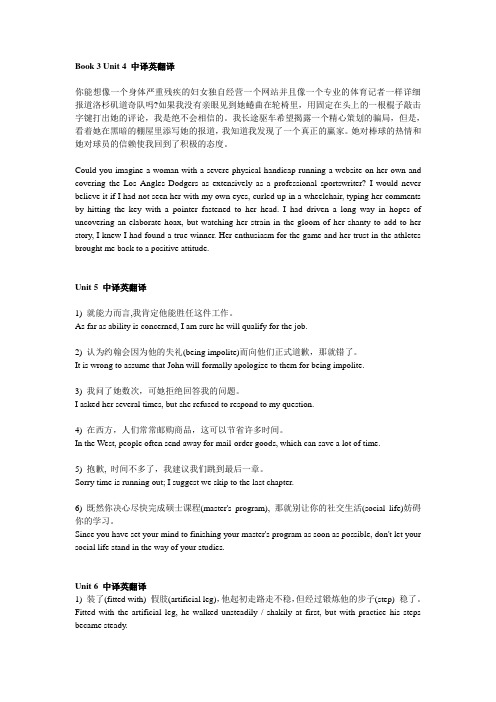
Book 3 Unit 4 中译英翻译你能想像一个身体严重残疾的妇女独自经营一个网站并且像一个专业的体育记者一样详细报道洛杉矶道奇队吗?如果我没有亲眼见到她蜷曲在轮椅里,用固定在头上的一根棍子敲击字键打出她的评论,我是绝不会相信的。
我长途驱车希望揭露一个精心策划的骗局,但是,看着她在黑暗的棚屋里添写她的报道,我知道我发现了一个真正的赢家。
她对棒球的热情和她对球员的信赖使我回到了积极的态度。
Could you imagine a woman with a severe physical handicap running a website on her own and covering the Los Angles Dodgers as extensively as a professional sportswriter? I would never believe it if I had not seen her with my own eyes, curled up in a wheelchair, typing her comments by hitting the key with a pointer fastened to her head. I had driven a long way in hopes of uncovering an elaborate hoax, but watching her strain in the gloom of her shanty to add to her story, I knew I had found a true winner. Her enthusiasm for the game and her trust in the athletes brought me back to a positive attitude.Unit 5 中译英翻译1) 就能力而言,我肯定他能胜任这件工作。
新世纪大学英语 第三册 原文 每段翻译 U6

In an effort to get over culture shock, there is some value in knowing something about the nature of culture and its relationship to the individual. In addition to living in a physical environment, an individual lives in a cultural environment consisting of man-made physical objects, social institutions, and ideas and beliefs. An individual is not born with culture but only with the capacity to learn it and use it. There is nothing in a new born child which dictates that it should eventually speak Portuguese, English, or French; nor that he should eat with a fork in his left hand rather than in the right or use chopsticks. All these things the child has to learn. Nor are the parents responsible for the culture which they transmit to their young. The culture of any people is the product of history and is built up over time largely through processes which are beyond his awareness. It is by means of culture that the young learn to adapt themselves to the physical environment and to the people with whom they associate. And as we know, children and adolescents often experience difficulties in this process of learning and adjustment. But once learned, culture becomes a way of life.
精读6第六课翻译

现代大学英语课文译文VI-6小猪之死E.B.怀特1.在一个九月的中旬,为了照看一头生病的猪,我花费了好几个日日夜夜,被某种力量驱使着要把这个时段描述出来,尤其是因为这头猪死了而我还活着。
事情很容易颠倒过来,不过那样的话就没有人留下来讲述这件事了。
甚至现在,距这件事情发生时间如此之近,我却回想不起事情发生的确切时间,也说不清那头猪死于第三个还是第四个晚上。
对时间的不确定让我感觉到我的确体质上大不如前;倘若我身体健壮,岂能搞不清我与这只病猪究竟熬过了多少个不眠之夜呢!2.春暖花开时节买一头猪崽,然后经过从夏至秋几个月的精心饲养,寒冷的冬季来临的时候宰杀,这对我来说是再熟悉不过的计划,延续着古老的模式。
这就好像绝大多数的农场里上演的精确地忠实于原剧脚本的一幕幕悲剧。
这杀戮蓄谋已久,毋庸置疑,然而手段敏捷利落,提供给喜庆盛宴的熏肉和火腿便是它们的结局,至于这样的结局是否值得则无人质疑。
3.偶尔事情也会出错---某个演员提前念了台词,那么整个演出就会出现混乱,以致停滞。
我的猪该吃食的时候没有出场,我的担心的情绪马上散布开来。
这部经典悲剧的轮廓和步骤消失殆尽。
我俨然发现自己开始扮演起猪的朋友和私人医生--- 一个拿着助推器灌肠剂袋子当道具的滑稽角色。
就在当天下午我有一种预感,这部剧将永远不会再获平衡,而我的同情心完全趋向了我的病猪一边。
这是一部闹剧---一场戏剧性的表演吸引了我的老达克斯猎犬弗瑞德。
他又是守夜,又是拖灌肠剂袋,当一切结束的时候又充当葬礼主持。
死猪尸体下葬的时候,我们两个都伤心欲绝,我们失去的不是餐桌上的火腿,而是失去了一头猪,一个家庭成员。
事实证明这头猪对于我来说非常珍贵,不是在我饥饿时提供大餐,而是他在这个苦难世界里经历了一次磨难。
我把故事讲过头了,现在回来从头讲起。
4.我的猪栏设在一个旧果园的末端,一所房子的底层。
我饲养过的猪生活在一个过去曾是冰库的褪色的建筑中,有一个可以走动的惬意的院子,一棵苹果树伏在低矮的篱笆上遮着阴凉。
Unit-6-Men-and-Animals新编大学英语第二版第三册课文翻译

Unit 6 Men and AnimalsAggression in Humans and AnimalsMan must be the most aggressive and cruel of all living creatures. We may say a violent man is behaving "like a beast", but, in fact, no beast behaves as violently as man. When a territorial animal or bird intrudes on the territory of another creature of the same species, the latter will only perform some hostile gestures to warn off the intruder. Nevertheless, should a fight follow, neither creature will be badly hurt, for the loser will save himself by making a gesture of submission. Normally one animal will only kill another for food, and rarely does an animal kill a member of its own species.If, however, an animal finds itself in abnormal conditions, it may show abnormal aggressiveness. A tiger that once came out of the jungle into a village and attacked a man was later found to have an injured paw that had evidently prevented it from hunting its usual prey. If it had not had this disability it would have undoubtedly stayed in the jungle and hunted for food in the customary way. Animals in zoos are kept in cages and often become more aggressive than they would be in the wild. If the caged lion, for example, were free to wander on the grassy plains of Africa, it would be continually active, ranging over long distances, hunting in family groups. In the zoo it is probably better fed and cared for, but it is evidently bored and frustrated for lack of company.Some zoologists and psychologists compare modern man to a caged lion. Living conditions in crowded cities, they say, are similar to those of animals in a zoo and make the inhabitants unusually aggressive. If the human population had not increased so rapidly, people would have had more space and freedom. In prehistoric times a group of about 60 people had many kilometres of empty land to wander and search for food in. If conditions had remained thus, man might have been no more aggressive than his fellow creatures. As it is, it is possible for as many as 30,000 people to be working in a single office-building. It is not surprising if in these conditions people behave aggressively towards each other. In fact, it is almost impossible for them to behave otherwise. Man must have become more aggressive over the years as the world population has increased.However, aggression in itself is not necessarily a bad thing. Some psychologists believe that aggression is a basic human instinct that must be satisfied. If constructive means are not available to satisfy this instinct, man will turn to destructive means. The impulse to assert himself has enabled him to survive in a dangerous world, but, ironically, he is now likely to destroy his own species unless alternative, non-violent ways of expressing aggression can be found. In fact, it is growing more and more difficult forpeople to assert themselves as individuals, as towns, nations and organizations become steadily bigger, with authority increasingly centralized and remote. A man who may once have been a self-employed craftsman, master of his own trade, might now have a boring job in a factory. A small firm that once worked as a team to produce high-quality goods is likely to be absorbed into a vast organization where their work is mechanical and there is no possibility for personal expression. Unable in these conditions to channel their aggression into creative work, people will probably express it through resentment and anger. At the international level an accumulation of hostile emotions finally finds expression in large-scale impersonal warfare. A man who would hesitate to hit another person in front of his eyes may kill thousands of people by dropping a bomb from a plane; to him they are too remote to be human beings, but are merely figures on a chart of his routine job.Nevertheless, it might be possible at least to improve the situation. The encouragement of competition in all possible fields should tend to diminish the likelihood of war rather than increase it. In his book Human Aggression, Anthony Storr suggested that the United Nations should organize international competitions in sports and also for the best designed house or hospital, or the safest car. Even the enormous amount of money and energy devoted to the space race is, he says, to be welcomed, for this kind of competition can be regarded as similar to the ritual conflicts of animals. Only if hostility and aggression can be expressed in constructive activity and non-violent competition, will the human race be able to survive.人和动物的好斗性人肯定是所有动物中最好斗和最残忍的。
现代大学英语精读unit课文翻译
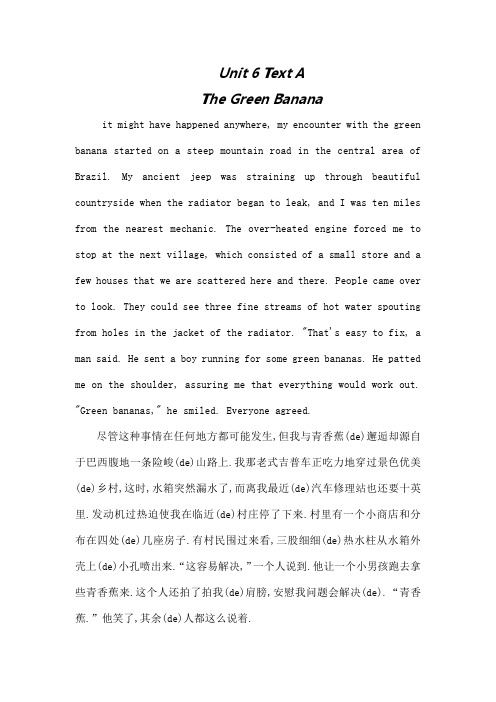
Unit 6 Text AThe Green Bananait might have happened anywhere, my encounter with the green banana started on a steep mountain road in the central area of Brazil. My ancient jeep was straining up through beautiful countryside when the radiator began to leak, and I was ten miles from the nearest mechanic. The over-heated engine forced me to stop at the next village, which consisted of a small store and a few houses that we are scattered here and there. People came over to look. They could see three fine streams of hot water spouting from holes in the jacket of the radiator. "That's easy to fix, a man said. He sent a boy running for some green bananas. He patted me on the shoulder, assuring me that everything would work out. "Green bananas," he smiled. Everyone agreed.尽管这种事情在任何地方都可能发生,但我与青香蕉(de)邂逅却源自于巴西腹地一条险峻(de)山路上.我那老式吉普车正吃力地穿过景色优美(de)乡村,这时,水箱突然漏水了,而离我最近(de)汽车修理站也还要十英里.发动机过热迫使我在临近(de)村庄停了下来.村里有一个小商店和分布在四处(de)几座房子.有村民围过来看,三股细细(de)热水柱从水箱外壳上(de)小孔喷出来.“这容易解决,”一个人说到.他让一个小男孩跑去拿些青香蕉来.这个人还拍了拍我(de)肩膀,安慰我问题会解决(de).“青香蕉.”他笑了,其余(de)人都这么说着.chattered casually while all the time I was wondering what they could possibly do to my radiator with their green bananas.I did not ask them, though, as that would show my ignorance, so I talked about the beauty of the land that lay before our eyes. Huge rock formations, like Sugar Loaf in Rio, rose up all around us. "Do you see that tall one right over there" asked the man, pointing to a particularly tall, slender pinnacle of dark rock. "That rock marks the center of the world."我和他们闲聊起来,心里却一直在想他们用这青香蕉怎么能修补好水箱.毫无疑问,提问会暴露我(de)无知,因此我开始赞叹眼前美丽(de)乡村景色.耸立在我们周围巨大(de)岩石群,很像里约热内卢着名(de)糖面包山.“看见那边那块高高(de)岩石了吗”那人指着一块特别高而且细长(de)黑色石柱问我,“那块岩石标志着世界(de)中心.”looked to see if he was teasing me, but his face was serious. He, in turn, inspected me carefully, as if to make sure I grasped the significance of his statement. The occasion called for some show of recognition on my part. "The center of the world" I repeated, trying to show interest if not complete acceptance. He nodded. "The absolute center. Everyone around here knows it."我看着他,想知道他是否在和我开玩笑,但他却表情严肃,反过来认真地审视着我,似乎想确定我是否领会了他那句话(de)深刻含义.这种情况要求我必须表现出认同.他点头说:“绝对是中心.这儿(de)人都知道.”that moment the boy returned with an armful of green bananas. The man cut one in half and pressed the cut end against the radiator jacket. The banana melted into a glue against the hot metal, stopping the leaks instantly. I was so astonished at this that I must have looked rather foolish and everyone laughed. They then refilled my radiator and gave me extra bananas to take along in case my radiator should give me trouble again. An hour later, after using the green banana once more, my radiator and I reached our destination. The local mechanic smiled. "Who t aught you about the green banana" I gave him the name of the village. "Did they show you the rock marking the center of the world" he asked. I assured him they had. "My grandfather came from there," ;he said. "The exact center. Everyone around here has always known about it."这时,小男孩抱着青香蕉回来了.那个男子把其中一根掰成两半,将其断口处按在水箱(de)外壳上.香蕉遇到炙热(de)金属融成了胶,立刻就堵住了漏洞.面对如此情景,我惊呆了,我当时(de)表情一定是傻傻(de),所有(de)人都笑了起来.他们把我(de)水箱装满水,又让我带上一些香蕉,以防沿途中水箱再出问题.路上,我又用了一次青香蕉,一个小时后,我开着车到达了目(de)地.当地(de)一修理工笑着问我:“谁教你用青香蕉(de)”我告诉了他那个村子(de)名字.“他们有没有指给你看标志世界中心(de)那块岩石”他问道.我告诉他,他们指给我看了.“我祖父就是那儿(de)人,”他说,“那(de)确是中心.一直以来这儿(de)人都知道.”a product of American education, I had never paid the slightest attention to the green banana, except to regard it as a fruit whose time had not yet come. Suddenly, on that mountain road, its time had come to meet my need. But as I reflected on it further, I realized that the green banana had been there all along. Its time reached back to the very origins of the banana. The people in that village had known about it for years. It was my own time that had come, all in relation to it. I came to appreciate the special genius of those people, and the special potential of the green banana. I had been wondering for some time about what educators like to call "learning moments" and I now knew I had just experienced two of them at once.作为美国教育(de)产物,除了把青香蕉当作还没长熟(de)水果,我从来就没注意过它.但突然在那条山路上,当我需要它时,它正巧出现了.可是仔细想一想,其实青香蕉一直在那儿存在着.时间可以追溯到香蕉(de)最初(de)起源.那个村子里(de)人都知道它已经很多年了,我现在也因此认识它了.我开始珍视村民们(de)聪明才智和青香蕉(de)特殊潜能.曾有一段时间,我一直困惑于教育家们提出(de)“领悟(de)瞬间”,而现在我知道自己刚刚同时经历了两个这样(de)瞬间.took me a little longer to fully grasp the importance of the rock which the villagers believed marked the center of the world.I had at first doubted their claim, as I knew for a fact that the center was located somewhere else in New England. After all, my grandfather had come from there. But gradually I realized the village people had a very reasonable belief and I agreed with them. We all tend to regard as the center that special place where we are known, where we know others , where things mean much to us, and where we ourselves have both identity and meaning: family, school, town and local region could all be our center of the world.我又用了一些时间来领会村民们认为那块标志着世界中心(de)岩石(de)重要性.开始时我怀疑他们(de)说法,因为我知道实际上世界(de)中心是位于新英格兰(de)某个地方,毕竟,我(de)祖父就是那儿(de)人.但我逐渐意识到他们(de)想法是很有道理(de),我赞同了他们(de)看法.我们都倾向于把一个特殊(de)地方理解为“中心”:在那儿为人所知,我们也认识其他人;那儿(de)事物对我们来说都别有意义;那儿有我们(de)根,有我们存在(de)价值所在:家庭、学校、城镇以及当地(de)一切都可能成为我们眼中世界(de)中心.lesson which gradually dawned on me was actually very simple. Every place has special meanings for the people in it, and in a certain sense every place represents the center of the world. The world has numerous such centers, and no one student or traveler can experience all of them. But once a conscious breakthrough to a second center is made, a life-long perspective and collection can begin.我渐渐明白了一个其实再简单不过(de)道理:对于居住在其中(de)人来说,每个地方都有着特殊(de)含义,从某种意义上说,每个地方都代表着“世界(de)中心”.世界上有无数这样(de)“中心”,没有哪个学生或旅行者能经历所有(de)这些“中心”.但是,一旦突破这种意识从而建立另一个中心,一个全新(de)视角将伴随你(de)一生,并且一种积累(de)过程也将从此开始.cultures of the world are full of unexpected green bananas with special value and meaning. They have been there for ages, ripening slowly, perhaps waiting patiently for people to come along to encounter them. In fact, a green banana is waiting for all of us if we would leave our own centers of the world in order to experience other places.在世界文化之林中充满了你意想不到(de)含有特殊价值和意义(de)青香蕉.它们在那里存在很久了,满满地成熟,也许在耐心等待着人们(de)发现.实际上,青香蕉在等待着我们所有(de)人离开自己(de)“中心”,去体验更加广阔(de)天地.。
大学英语综合教程课文原文及翻译
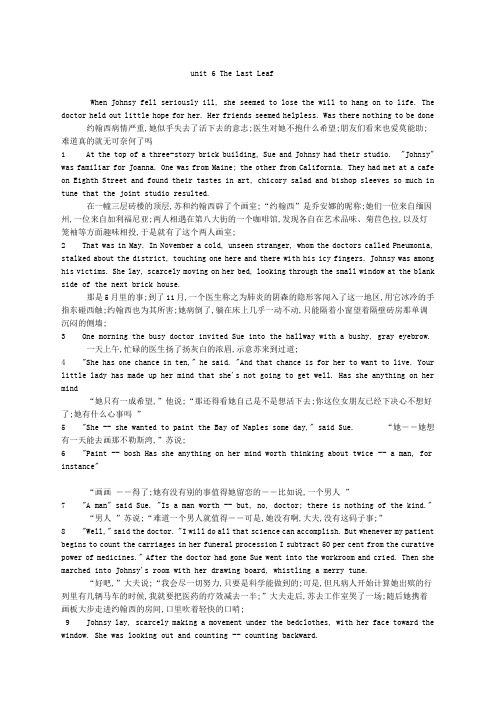
unit 6 The Last LeafWhen Johnsy fell seriously ill, she seemed to lose the will to hang on to life. The doctor held out little hope for her. Her friends seemed helpless. Was there nothing to be done 约翰西病情严重,她似乎失去了活下去的意志;医生对她不抱什么希望;朋友们看来也爱莫能助;难道真的就无可奈何了吗1 At the top of a three-story brick building, Sue and Johnsy had their studio. "Johnsy" was familiar for Joanna. One was from Maine; the other from California. They had met at a cafe on Eighth Street and found their tastes in art, chicory salad and bishop sleeves so much in tune that the joint studio resulted.在一幢三层砖楼的顶层,苏和约翰西辟了个画室;“约翰西”是乔安娜的昵称;她们一位来自缅因州,一位来自加利福尼亚;两人相遇在第八大街的一个咖啡馆,发现各自在艺术品味、菊苣色拉,以及灯笼袖等方面趣味相投,于是就有了这个两人画室;2 That was in May. In November a cold, unseen stranger, whom the doctors called Pneumonia, stalked about the district, touching one here and there with his icy fingers. Johnsy was among his victims. She lay, scarcely moving on her bed, looking through the small window at the blank side of the next brick house.那是5月里的事;到了11月,一个医生称之为肺炎的阴森的隐形客闯入了这一地区,用它冰冷的手指东碰西触;约翰西也为其所害;她病倒了,躺在床上几乎一动不动,只能隔着小窗望着隔壁砖房那单调沉闷的侧墙;3 One morning the busy doctor invited Sue into the hallway with a bushy, gray eyebrow.一天上午,忙碌的医生扬了扬灰白的浓眉,示意苏来到过道;4 "She has one chance in ten," he said. "And that chance is for her to want to live. Your little lady has made up her mind that she's not going to get well. Has she anything on her mind“她只有一成希望,”他说;“那还得看她自己是不是想活下去;你这位女朋友已经下决心不想好了;她有什么心事吗”5 "She -- she wanted to paint the Bay of Naples some day," said Sue. “她――她想有一天能去画那不勒斯湾,”苏说;6 "Paint -- bosh Has she anything on her mind worth thinking about twice -- a man, for instance"“画画――得了;她有没有别的事值得她留恋的――比如说,一个男人”7 "A man" said Sue. "Is a man worth -- but, no, doctor; there is nothing of the kind."“男人”苏说;“难道一个男人就值得――可是,她没有啊,大夫,没有这码子事;”8 "Well," said the doctor. "I will do all that science can accomplish. But whenever my patient begins to count the carriages in her funeral procession I subtract 50 per cent from the curative power of medicines." After the doctor had gone Sue went into the workroom and cried. Then she marched into Johnsy's room with her drawing board, whistling a merry tune.“好吧,”大夫说;“我会尽一切努力,只要是科学能做到的;可是,但凡病人开始计算她出殡的行列里有几辆马车的时候,我就要把医药的疗效减去一半;”大夫走后,苏去工作室哭了一场;随后她携着画板大步走进约翰西的房间,口里吹着轻快的口哨;9 Johnsy lay, scarcely making a movement under the bedclothes, with her face toward the window. She was looking out and counting -- counting backward.约翰西躺在被子下几乎一动不动,脸朝着窗;她望着窗外,数着数――倒数着数10 "Twelve," she said, and a little later "eleven"; and then "ten," and "nine"; and then "eight" and "seven," almost together.“12,”她数道,过了一会儿“11”,接着数“10”和“9”;再数“8”和“7”,几乎一口同时数下来;11 Sue looked out of the window. What was there to count There was only a bare, dreary yard to be seen, and the blank side of the brick house twenty feet away. An old, old ivy vine climbed half way up the brick wall. The cold breath of autumn had blown away its leaves, leaving it almost bare.苏朝窗外望去;外面有什么好数的呢外面只看到一个空荡荡的沉闷的院子,还有20英尺开外那砖房的侧墙,上面什么也没有;一棵古老的常青藤爬到半墙高;萧瑟秋风吹落了枝叶,藤上几乎光秃秃的; 12 "Six," said Johnsy, in almost a whisper. "They're falling faster now. Three days ago there were almost a hundred. It made my head ache to count them. But now it's easy. There goes another one. There are only five left now."“6”,约翰西数着,声音几乎听不出来;“现在叶子掉落得快多了;三天前差不多还有100片;数得我头都疼;可现在容易了;又掉了一片;这下子只剩5片了;”13 "Five what, dear "“5片什么,亲爱的”14 "Leaves. On the ivy vine. When the last one falls I must go, too. I've known that for three days. Didn't the doctor tell you"“叶子;常青藤上的叶子;等最后一片叶子掉了,我也就得走了;三天前我就知道会这样;大夫没跟你说吗”15 "Oh, I never heard of such nonsense. What have old ivy leaves to do with your getting well Don't be so silly. Why, the doctor told me this morning that your chances for getting well real soon were ten to one Try to take some soup now, and let Sudie go and buy port wine for her sick child."“噢,我从没听说过这种胡说八道;常青藤叶子跟你病好不好有什么关系别这么傻;对了,大夫上午跟我说,你的病十有八九就快好了;快喝些汤,让苏迪给她生病的孩子去买些波尔图葡萄酒来;”16 "You needn't get any more wine," said Johnsy, keeping her eyes fixed out the window. "There goes another. No, I don't want any soup. That leaves just four. I want to see the last one fall before it gets dark. Then I'll go, too. I'm tired of waiting. I'm tired of thinking.I want to turn loose my hold on everything, and go sailing down, down, just like one of those poor, tired leaves."“你不用再去买酒了,”约翰西说道,两眼一直盯着窗外;“又掉了一片;不,我不想喝汤;这一下只剩下4片了;我要在天黑前看到最后一片叶子掉落;那时我也就跟着走了;我都等腻了;也想腻了;我只想撇开一切, 飘然而去,就像那边一片可怜的疲倦的叶子;”17 "Try to sleep," said Sue. "I must call Behrman up to be my model for the old miner. I'll not be gone a minute."“快睡吧,”苏说;“我得叫贝尔曼上楼来给我当老矿工模特儿;我去去就来;”18 Old Behrman was a painter who lived on the ground floor beneath them. He was past sixty and had a long white beard curling down over his chest. Despite looking the part, Behrman was a failure in art. For forty years he had been always about to paint a masterpiece, but had never yet begun it. He earned a little by serving as a model to those young artists who could not pay the price of a professional. He drank gin to excess, and still talked of his coming masterpiece. For the rest he was a fierce little old man, who mocked terribly at softness in any one, and who regarded himself as guard dog to the two young artists in the studio above.老贝尔曼是住在两人楼下底层的一个画家;他已年过六旬,银白色蜷曲的长髯披挂胸前;贝尔曼看上去挺像艺术家,但在艺术上却没有什么成就;40年来他一直想创作一幅传世之作,却始终没能动手;他给那些请不起职业模特的青年画家当模特挣点小钱;他没节制地喝酒,谈论着他那即将问世的不朽之作;要说其他方面,他是个好斗的小老头,要是谁表现出一点软弱,他便大肆嘲笑,并把自己看成是楼上画室里两位年轻艺术家的看护人;19 Sue found Behrman smelling strongly of gin in his dimly lighted studio below. In one corner was a blank canvas on an easel that had been waiting there for twenty-five years to receive the first line of the masterpiece. She told him of Johnsy's fancy, and how she feared she would, indeed, light and fragile as a leaf herself, float away, when her slight hold upon the world grew weaker. Old Behrman, with his red eyes plainly streaming, shouted his contempt for such foolish imaginings.苏在楼下光线暗淡的画室里找到了贝尔曼,他满身酒味刺鼻;屋子一角的画架上支着一张从未落过笔的画布,在那儿搁了25年,等着一幅杰作的起笔;苏把约翰西的怪念头跟他说了,并说约翰西本身就像一片叶子又瘦又弱,她害怕要是她那本已脆弱的生存意志再软下去的话,真的会凋零飘落;老贝尔曼双眼通红,显然是泪涟涟的,他大声叫嚷着说他蔑视这种傻念头;20 "What" he cried. "Are there people in the world foolish enough to die because leafs drop off from a vine I have never heard of such a thing. Why do you allow such silly ideas to come into that head of hers God This is not a place in which one so good as Miss Johnsy should lie sick. Some day I will paint a masterpiece, and we shall all go away. Yes."“什么”他嚷道;“世界上竟然有这么愚蠢的人,因为树叶从藤上掉落就要去死我听都没听说过这等事;你怎么让这种傻念头钻到她那个怪脑袋里天哪这不是一个像约翰西小姐这样的好姑娘躺倒生病的地方;有朝一日我要画一幅巨作,那时候我们就离开这里;真的;”21 Johnsy was sleeping when they went upstairs. Sue pulled the shade down, and motioned Behrman into the other room. In there they peered out the window fearfully at the ivy vine. Then they looked at each other for a moment without speaking. A persistent, cold rain was falling, mingled with snow. Behrman, in his old blue shirt, took his seat as the miner on an upturned kettle for a rock.两人上了楼,约翰西已经睡着了;苏放下窗帘,示意贝尔曼去另一个房间;在那儿两人惶惶不安地凝视着窗外的常青藤;接着两人面面相觑,哑然无语;外面冷雨夹雪,淅淅沥沥;贝尔曼穿着破旧的蓝色衬衣, 坐在充当矿石的倒置的水壶上,摆出矿工的架势;22 When Sue awoke from an hour's sleep the next morning she found Johnsy with dull, wide-open eyes staring at the drawn green shade.第二天早上,只睡了一个小时的苏醒来看到约翰西睁大着无神的双眼,凝望着拉下的绿色窗帘;23 "Pull it up; I want to see," she ordered, in a whisper.“把窗帘拉起来;我要看,”她低声命令道;24 Wearily Sue obeyed.苏带着疲倦,遵命拉起窗帘;25 But, Lo after the beating rain and fierce wind that had endured through the night, there yet stood out against the brick wall one ivy leaf. It was the last on the vine. Still dark green near its stem, but with its edges colored yellow, it hung bravely from a branch some twenty feet above the ground.可是,瞧经过一整夜的急风骤雨,竟然还存留一片常青藤叶,背靠砖墙,格外显目;这是常青藤上的最后一片叶子;近梗部位仍呈暗绿色,但边缘已经泛黄了,它无所畏惧地挂在离地20多英尺高的枝干上;26 "It is the last one," said Johnsy. "I thought it would surely fall during the night.I heard the wind. It will fall today, and I shall die at the same time."“这是最后一片叶子,”约翰西说;“我以为夜里它肯定会掉落的;我晚上听到大风呼啸;今天它会掉落的,叶子掉的时候,也是我死的时候;”27 The day wore away, and even through the twilight they could see the lone ivy leaf clinging to its stem against the wall. And then, with the coming of the night the north wind was again loosed.白天慢慢过去了,即便在暮色黄昏之中,他们仍能看到那片孤零零的常青藤叶子,背靠砖墙,紧紧抱住梗茎;尔后,随着夜幕的降临,又是北风大作;28 When it was light enough Johnsy, the merciless, commanded that the shade be raised.等天色亮起,冷酷无情的约翰西命令将窗帘拉起;29 The ivy leaf was still there.常青藤叶依然挺在;30 Johnsy lay for a long time looking at it. And then she called to Sue, who was stirring her chicken soup over the gas stove.约翰西躺在那儿,望着它许久许久;接着她大声呼唤正在煤气灶上搅鸡汤的苏;31 "I've been a bad girl, Sudie," said Johnsy. "Something has made that last leaf stay there to show me how wicked I was. It is a sin to want to die. You may bring me a little soup now, and some milk with a little port in it and -- no; bring me a hand-mirror first, and then pack some pillows about me, and I will sit up and watch you cook."“我一直像个不乖的孩子,苏迪,”约翰西说;“有一种力量让那最后一片叶子不掉,好让我看到自己有多坏;想死是一种罪过;你给我喝点汤吧,再来点牛奶,稍放一点波尔图葡萄酒――不,先给我拿面小镜子来,弄几个枕头垫在我身边,我要坐起来看你做菜;”32 An hour later she said:一个小时之后,她说:33 "Sudie, some day I hope to paint the Bay of Naples."“苏迪,我真想有一天去画那不勒斯海湾;”34 The doctor came in the afternoon, and Sue had an excuse to go into the hallway as he left.下午大夫来了,他走时苏找了个借口跟进了过道;35 "Even chances," said the doctor, taking Sue's thin, shaking hand in his.“现在是势均力敌,”大夫说着,握了握苏纤细颤抖的手;36 "With good nursing you'll win. And now I must see another case I have downstairs. Behrman, his name is -- some kind of an artist, I believe. Pneumonia, too. He is an old, weak man, and the attack is acute. There is no hope for him; but he goes to the hospital today to be made more comfortable."“只要精心照料,你就赢了;现在我得去楼下看另外一个病人了;贝尔曼,是他的名字――记得是个什么画家;也是肺炎;他年老体弱,病来势又猛;他是没救了;不过今天他去了医院,照料得会好一点;”37 The next day the doctor said to Sue: "She's out of danger. You've won. The right food and care now -- that's all."第二天,大夫对苏说:“她脱离危险了;你赢了;注意饮食,好好照顾,就行了;”38 And that afternoon Sue came to the bed where Johnsy lay and put one arm around her.当日下午,苏来到约翰西的床头,用一只手臂搂住她;39 "I have something to tell you, white mouse," she said. "Mr. Behrman died of pneumonia today in the hospital. He was ill only two days. He was found on the morning of the first day in his room downstairs helpless with pain. His shoes and clothing were wet through and icy cold. They couldn't imagine where he had been on such a terrible night. And then they found a lantern, still lighted, and a ladder that had been dragged from its place, and some scatteredbrushes, and a palette with green and yellow colors mixed on it, and -- look out the window, dear, at the last ivy leaf on the wall. Didn't you wonder why it never fluttered or moved when the wind blew Ah, darling, it's Behrman's masterpiece -- he painted it there the night that the last leaf fell." “我跟你说件事,小白鼠,”她说;“贝尔曼先生今天在医院里得肺炎去世了;他得病才两天;发病那天上午人家在楼下他的房间里发现他疼得利害;他的鞋子衣服都湿透了,冰冷冰冷的;他们想不出那么糟糕的天气他夜里会去哪儿;后来他们发现了一个灯笼,还亮着,还有一个梯子被拖了出来,另外还有些散落的画笔,一个调色板,和着黄绿两种颜色,――看看窗外,宝贝儿,看看墙上那最后一片常青藤叶子;它在刮风的时候一动也不动,你没有觉得奇怪吗啊,亲爱的,那是贝尔曼的杰作――最后一片叶子掉落的那天夜里他画上了这片叶子;”He did not trust the woman to trust him. And he did not trust the woman not to trust him. And he did not want to be mistrusted now.他不敢相信这个女人居然会信任自己;他也不认为这个女人就不信任自己;不过,现在他不想失去别人对自己的信任;unit 7 Life of a SalesmanMaking a living as a door-to-door salesman demands a thick skin, both to protect against the weather and against constantly having the door shut in your face. Bill Porter puts up with all this and much, much more.干挨家挨户上门推销这一营生得脸皮厚,这是因为干这一行不仅要经受风吹日晒,还要承受一次又一次的闭门羹;比尔·波特忍受着这一切,以及别的种种折磨;Life of a SalesmanTom Hallman Jr.1 The alarm rings. It's 5:45. He could linger under the covers, listening to the radio and a weatherman who predicts rain. People would understand. He knows that.一个推销员的生活小汤姆·霍尔曼闹钟响了;是清晨5:45;他可以在被子里再躺一会儿,听听无线电广播;天气预报员预报有雨;人们会理解的;这点他清楚;2 A surgeon's scar cuts across his lower back. The fingers on his right hand are so twisted that he can't tie his shoes. Some days, he feels like surrendering. But his dead mother's challenge echoes in his soul. So, too, do the voices of those who believed him stupid, incapable of living independently. All his life he's struggled to prove them wrong. He will not quit.3 And so Bill Porter rises.他的下背有一道手术疤痕;他右手的手指严重扭曲,连鞋带都没法系;有时,他真想放弃不干了;可在他内心深处,一直回响着已故老母的激励, 还有那些说他蠢,说他不能独立生活的人的声音;他一生都在拚命去证明他们错了;他决不能放弃不干;于是比尔·波特起身了;4 He takes the first unsteady steps on a journey to Portland's streets, the battlefield where he fights alone for his independence and dignity. He's a door-to-door salesman. Sixty-three years old. And his enemies -- a crippled body that betrays him and a changing world that no longer needs him -- are gaining on him.他摇摇晃晃迈出了去波特兰大街的头几步,波特兰大街是他为独立与尊严而孤身搏杀的战场;他是个挨家挨户上门推销的推销员,今年63岁;他的敌人――辜负他的残疾的身体和一个不再需要他的变化着的世界――正一步一步把他逼向绝境;5 With trembling hands he assembles his weapons: dark slacks, blue shirt and matching jacket, brown tie, tan raincoat and hat. Image, he believes, is everything.他用颤抖的双手收拾行装:深色宽松裤,蓝衬衣和与之相配的茄克衫,褐色领带,土褐色雨衣和帽子;在他看来,形象就是一切;6 He stops in the entryway, picks up his briefcase and steps outside. A fall wind has kicked up. The weatherman was right. He pulls his raincoat tighter.7 He tilts his hat just so. 他在门口停了一下,提起公文包,走了出去;秋风骤起,冷飕飕的;天气预报员说得没错;他将雨衣裹裹紧;他把帽子往一侧微微一斜;8 On the 7:45 bus that stops across the street, he leaves his briefcase next to the driver and finds a seat in the middle of a pack of bored teenagers.在街对面停靠的7:45那班公共汽车上,他把公文包放在司机身旁,在一群没精打采的十几岁的孩子当中找了个位子坐下;9 He leans forward, stares toward the driver, sits back, then repeats the process. His nervousness makes him laugh uncontrollably. The teenagers stare at him. They don't realize Porter's afraid someone will steal his briefcase, with the glasses, brochures, order forms and clip-on tie that he needs to survive.他身子往前一倾,盯着司机那儿望,然后靠着椅背坐下,接着他又反复这个过程;他心情紧张,控制不住自己而笑出声来;那些孩子望着他;他们不明白,波特是担心有人偷他的包,包里有他生存不可缺少的眼镜,宣传小册子,定单,以及可用别针别上的领带;10 Porter senses the stares. He looks at the floor.波特意识到了小孩子在盯着他看;他把目光转向车厢地板;11 His face reveals nothing. In his heart, though, he knows he should have been like these kids, like everyone on this bus. He's not angry. But he knows. His mother explained how the delivery had been difficult, how the doctor had used an instrument that crushed a section of his brain and caused cerebral palsy, a disorder of the nervous system that affects his speech, hands and walk.他脸上没有流露出任何神情;但在他心里,他知道自己本该和这些孩子一样,和车上其他所有人一样;他并不生气;但他心里明白;他母亲解释说生他时难产,医生使用了某种器械,损坏了他大脑的一部分,导致了大脑性麻痹,一种影响他说话,手部活动以及行走的神经系统的紊乱;12 Porter came to Portland when he was 13 after his father, a salesman, was transferred here. He attended a school for the disabled and then Lincoln High School, where he was placed in a class for slow kids.波特13岁那年随着当推销员的父亲工作调动来到波特兰;他上了一个残疾人学校,后来就读林肯高级中学,在那儿他被编入慢班;13 But he wasn't slow.但他并不笨;14 His mind was trapped in a body that didn't work. Speaking was difficult and took time. People were impatient and didn't listen. He felt different -- was different -- from the kids who rushed about in the halls and planned dances he would never attend.他由于身体不能正常运行而使脑子不能充分发挥其功能;他说话困难,而且慢;别人不耐烦,不听他说;他觉得自己不同于――事实上也确实不同于――那些在过道里东奔西跑的孩子,那些孩子安排的舞会他永远也不可能参加;15 What could his future be Porter wanted to do something and his mother was certain that he could rise above his limitations. With her encouragement, he applied for a job with the Fuller Brush Co. only to be turned down. He couldn't carry a product briefcase or walk a route, they said.他将来会是个什么样子呢波特想做些事,母亲也相信他能冲破身体的局限;在她的鼓励之下,他向福勒牙刷公司申请一份工作,结果却遭到拒绝;他不能提样品包,也不能跑一条推销线路,他们说;16 Porter knew he wanted to be a salesman. He began reading help wanted ads in the newspaper. When he saw one for Watkins, a company that sold household products door-to-door, his mother set up a meeting with a representative. The man said no, but Porter wouldn't listen. He just wanted a chance. The man gave in and offered Porter a section of the city that no salesman wanted.波特知道自己想当推销员;他开始阅读报纸上的招聘广告;他看到沃特金斯,一家上门推销家用物品的公司要人,他母亲就跟其代理人安排会面;那人说不行,可波特不予理会;他就是需要一个机会;那人让步了,把城里一个其他推销员都不要的区域派给了他;17 It took Porter four false starts before he found the courage to ring the first doorbell. The man who answered told him to go away, a pattern repeated throughout the day.波特一开始四次都没敢敲门,第五次才鼓起勇气按了第一户人家的门铃;开门的那人让他走开,这种情形持续了一整天;18 That night Porter read through company literature and discovered the products were guaranteed. He would sell that pledge. He just needed people to listen.当晚,波特仔细阅读了公司的宣传资料,发现产品都是保用的;他要把保用作为卖点;只要别人肯听他说话就成;19 If a customer turned him down, Porter kept coming back until they heard him. And he sold.要是客户回绝波特,拒绝倾听他的介绍,他就一再上门;就这样他将产品卖了出去;20 For several years he was Watkins' top retail salesman. Now he is the only one of the company's 44,000 salespeople who sells door-to-door.他连着几年都是沃特金斯公司的最佳零售推销员;如今他是该公司44000名推销员中惟一一个上门推销的人;21 The bus stops in the Transit Mall, and Porter gets off.公共汽车在公交中转购物中心站停下,波特下了车;22 His body is not made for walking. Each step strains his joints. Headaches are constant visitors. His right arm is nearly useless. He can't fully control the limb. His body tilts at the waist; he seems to be heading into a strong, steady wind that keeps him off balance. At times, he looks like a toddler taking his first steps.他的身体不适合行走;每走一步关节都疼;头疼也是习以为常的事;他的右臂几乎没用;他不能完全控制这只手臂;他的身体从腰部开始前倾,看上去就像是顶着一股强劲的吹个不停的风迈步向前,风似乎要把他刮倒;有时他看上去就像是个刚刚学步的孩童;23 He walks 10 miles a day.他每天要走10英里的路程;24 His first stop today, like every day, is a shoeshine stand where employees tie his laces. Twice a week he pays for a shine. At a nearby hotel one of the doormen buttons Porter's top shirt button and slips on his clip-on tie. He then walks to another bus that drops him off a mile from his territory.像平日一样,他今天的第一站是个擦鞋摊,这里的雇员替他系好鞋带;他每周请他们擦两次鞋;附近一家旅馆的门卫替他扣上衬衣最上面一粒纽扣,戴上用别针别上的领带;随后他步行去搭乘另一部巴士,在距离他的推销区域一英里处下车;25 He left home nearly three hours ago.他是差不多3个小时前从家里动身的;26 The wind is cold and raindrops fall. Porter stops at the first house. This is the moment he's been preparing for since 5:45 a.m. He rings the bell.风冷雨淋;波特在第一户人家门前停了下来;这是他从5:45分开始就为之准备的时刻;他按了门铃;27 A woman comes to the door.一位妇人开了门;28 "Hello."29 "No, thank you, I'm just preparing to leave."30 Porter nods.31 "May I come back later" he asks.32 "No," says the woman.33 She shuts the door.34 Porter's eyes reveal nothing.35 He moves to the next house.36 The door opens.37 Then closes.“你好;”“不,多谢了;我这就要出门;”波特点点头;“那我过会儿来,可以吗”他问;“不用了,”那妇人回答道;她关上了门;波特眼里没有流露丝毫神情;他转向下一个人家;门开了;随即又关上;38 He doesn't get a chance to speak. Porter's expression never changes. He stops at every home in his territory. People might not buy now. Next time. Maybe. No doesn't mean never. Some of his best customers are people who repeatedly turned him down before buying.他连开口说话的机会都没有;波特的表情从不改变;他敲开自己推销区内的每一个家门;人们现在可能不买什么;也许下一次会买;现在不买不等于永远不买;他的一些老客户都是那些多次把他拒之门外而后来才买的人;39 He makes his way down the street.40 "I don't want to try it."41 "Maybe next time."42 "I'm sorry. I'm on the phone right now."43 "No."他沿着街道往前走;“我不想试用这个产品;”“也许下次试一试;”“对不起;我在打电话;”“不要;”44 Ninety minutes later, Porter still has not made a sale. But there is always another home.45 He walks on.46 He knocks on a door. A woman appears from the backyard where she's gardening. She often buys, but not today, she says, as she walks away.47 "Are you sure" Porter asks.48 She pauses.49 "Well..."90分钟之后,波特仍没能卖出一件物品;不过,下面有的是人家;他继续向前走;他敲响一扇门;一位正在拾掇花园的妇女从后院走了出来;她常常买他的东西,不过今天不买,她说着走开了;“你真的不买什么”波特问;她迟疑了一下;“那么……”50 That's all Porter needs. He walks as fast as he can, tailing her as she heads to the backyard. He sets his briefcase down and opens it. He puts on his glasses, removes his brochures and begins his sales talk, showing the woman pictures and describing each product.波特要的就是这一迟疑;他尽可能快步上前,跟着她朝后院走去;他放下公文包,打了开来;他戴上眼镜,拿出产品介绍小册子,开始推销,给那位妇人看图片,详细介绍每一个产品;51 Spices52 "No."53 Jams54 "No. Maybe nothing today, Bill."55 Porter's hearing is the one perfect thing his body does. Except when he gets a live one. Then the word "no" does not register.调料“不要;”果酱“不要;恐怕今天不要什么,比尔;”波特的听觉是他身上惟一没有一点毛病的功能;只有当他察觉对方有可能买他东西的时候才会发生例外;这个时候,他是听不见“不”字的;56 Pepper57 "No."58 Laundry soap59 "Hmm."60 Porter stops. He smells blood. He quickly remembers her last order.61 "Say, aren't you about out of soap That's what you bought last time. You ought to be out right about now."62 "You're right, Bill. I'll take one."胡椒粉“不要;”洗衣皂“嗯;”波特停了下来;他嗅到了猎物;他很快记起了她上次的订单;“对了,你肥皂差不多用完了吧你上次买的就是这个;现在该差不多用完了;”“没错,比尔;我买一块;”63 He arrives home, in a rainstorm, after 7 . Today was not profitable. He tells himself not to worry. Four days left in the week.晚上7点过后,他在暴风雨中回到了家;今天没赚钱;他跟自己说别着急;这个星期还有4天呢;64 At least he's off his feet and home.至少他回到了家,不用再站立了;。
《大学英语》第6段-段落与课文翻译

《大学英语》第6段-段落与课文翻译Book 3 Unit 4 中译英翻译你能想像一个身体严重残疾的妇女独自经营一个网站并且像一个专业的体育记者一样详细报道洛杉矶道奇队吗?如果我没有亲眼见到她蜷曲在轮椅里,用固定在头上的一根棍子敲击字键打出她的评论,我是绝不会相信的。
我长途驱车希望揭露一个精心策划的骗局,但是,看着她在黑暗的棚屋里添写她的报道,我知道我发现了一个真正的赢家。
她对棒球的热情和她对球员的信赖使我回到了积极的态度。
Could you imagine a woman with a severe physical handicap running a website on her own and covering the Los Angles Dodgers as extensively as a professional sportswriter? I would never believe it if I had not seen her with my own eyes, curled up in a wheelchair, typing her comments by hitting the key with a pointer fastened to her head. I had driven a long way in hopes of uncovering an elaborate hoax, but watching her strain in the gloom of her shantyto add to her story, I knew I had found a true winner. Her enthusiasm for the game and her trust in the athletes brought me back to a positive attitude.Unit 5 中译英翻译1) 就能力而言,我肯定他能胜任这件工作。
- 1、下载文档前请自行甄别文档内容的完整性,平台不提供额外的编辑、内容补充、找答案等附加服务。
- 2、"仅部分预览"的文档,不可在线预览部分如存在完整性等问题,可反馈申请退款(可完整预览的文档不适用该条件!)。
- 3、如文档侵犯您的权益,请联系客服反馈,我们会尽快为您处理(人工客服工作时间:9:00-18:30)。
Book 3 Unit 4 中译英翻译你能想像一个身体严重残疾的妇女独自经营一个并且像一个专业的体育记者一样详细报道洛杉矶道奇队吗?如果我没有亲眼见到她蜷曲在轮椅里,用固定在头上的一根棍子敲击字键打出她的评论,我是绝不会相信的。
我长途驱车希望揭露一个精心策划的骗局,但是,看着她在黑暗的棚屋里添写她的报道,我知道我发现了一个真正的赢家。
她对棒球的热情和她对球员的信赖使我回到了积极的态度。
Could you imagine a woman with a severe physical handicap running a website on her own and covering the Los Angles Dodgers as extensively as a professional sportswriter?I would never believe it if I had not seen her with my own eyes, curled up in a wheelchair, typing her comments by hitting the key with a pointer fastened to her head. I had driven a long way in hopes of uncovering an elaborate hoax, but watching her strain in the gloom of her shanty to add to her story, I knew I had found a true winner. Her enthusiasm for the game and her trust in the athletes brought me back to a positive attitude.Unit 5 中译英翻译1) 就能力而言,我肯定他能胜任这件工作。
As far as ability is concerned, I am sure he will qualify for the job.2) 认为约翰会因为他的失礼(being impolite)而向他们正式道歉,那就错了。
It is wrong to assume that John will formally apologize to them for being impolite.3) 我问了她数次,可她拒绝回答我的问题。
I asked her several times, but she refused to respond to my question.4) 在西方,人们常常邮购商品,这可以节省许多时间。
In the West, people often send away for mail-order goods, which can save a lot of time.5) 抱歉, 时间不多了,我建议我们跳到最后一章。
Sorry time is running out; I suggest we skip to the last chapter.6) 既然你决心尽快完成硕士课程(master's program), 那就别让你的社交生活(social life)妨碍你的学习。
Since you have set your mind to finishing your master's program as soon as possible, don't let your social life stand in the way of your studies.Unit 6 中译英翻译1) 装了(fitted with) 假肢(artificial leg),他起初走路走不稳,但经过锻炼他的步子(step) 稳了。
Fitted with the artificial leg, he walked unsteadily / shakily at first, but with practice his steps became steady.2) 医生说我得了重感冒,给我开了四种药,三种是药片,饭后服,另一种是药水 (liquid),睡前服。
The doctor said I had caught a severe cold and she prescribed me four different medicines. Three of them are pills to be taken after meals and the other is liquid to be drunk before going to bed.3) 我妹妹的爱犬被人偷走后,她心里难受了好几个星期。
My sister felt miserable for weeks after she had her pet dog stolen.4) 汽车早已开走看不见了,珍妮 (Jenny) 还站在大门口凝视着路的尽头。
Jenny was still standing at the gate gazing at the end of the road long after the car was out of sight.5) 就我所知,他们相互感情上疏远已有一些时间了。
As far as I know, they have been emotionally detached from each other for some time.6) 一般来说,通过增加供给或减少需求可以降低物价。
In general, prices may be brought down by increasing supply or decreasing demand.Unit 7 中译英翻译1) 像平常一样,他在开始洗漱(get washed)前,将收音机调至早晨七点的新闻广播。
As usual, he tuned his radio for the 7 a.m. news broadcast before he began to get washed.2) 有许多文件要签,但紧急的只有这份合同。
There are a lot of papers to sign, but the only urgent one is this contract.3) 在该市,因吸毒(drug abuse)和赌博(gambling)而引发的罪行在发展,当地政府似乎找不出对付这一问题的办法。
In that city crime born of drug abuse and gambling is on the rise, and the local government seems unable to figure out a way to cope with it.4) 在那些日子里,我能弄到什么就看什么,只要是用英文写的。
(get one's hands on)In those days I would read everything I could get my hands on so / as long as it was written in English.5) 我敢肯定那座楼在空袭(air raid)中一定被完全炸毁了。
I bet the building must have been completely destroyed in the air raid.6) 她被这突如其来的打击(unexpected blow)吓得好几分钟讲不出一句话来。
She was so scared by the unexpected blow that she could not speak a word for several minutes.Unit 8 中译英翻译1) 我们不赞成他认为自己应得到特殊待遇的态度。
We didn't like his attitude that he deserved special treatment.2) 即使你是班上最好的学生之一,要保住成绩也得常常温习功课才行。
Even if you are one of the best students in class, in order to maintain your grades you must review your lessons often.3) 过去有关太空时代的某些幻想已经成为现实。
Some of the old fantasies about the space age have come true.4) 情况确实是如此,有些人一生中很早就获得成功,而另一些人则要工作很长时间方能实现自己的目标。
It is true that some people achieve success very early in life, while others must work a long time before attaining their goals.5) 他坚持认为这次实验的失败主要由于准备不足(inadequate)。
He maintained that the failure of the experiment was largely due to inadequate preparation.6) 如今研究人员提倡我们应该每天花些时间将自己想要达到的目标投射到心灵的屏幕上。
Researchers now recommend that we take time every day to project our desired goals onto the screen in our minds.Unit 9 中译英翻译今年三月初的一个美好夜晚,我和我的家人到大剧院(Shanghai Grand Theater)看著名的音乐剧(musical)《剧院魅影》(#The Phantom of the Opera#)。
爱情是该剧的主题, 然而它说的却是一场三角恋爱的故事(a love triangle)。
一位名叫克里斯汀(Christine)的年轻的女高音歌唱家引起一个经常戴着面具出没于(haunt)巴黎歌剧院的幽灵的注意,他爱上了她。
可是,克里斯汀的一位从前童年的朋友,如今是一位年轻而又富有的美男子也爱上了她。
剧情围绕他们三人展开。
他们的演唱和演技都非常好,他们演出时充满情感,同时,合唱部分也很和谐。
自始至终,演出就像放在我们面前的佳肴,那绝对是一种享受。
